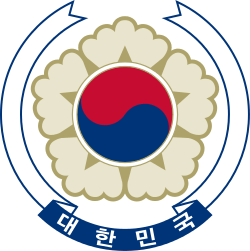Korea and the United Nations
  | |
| United Nations membership | |
|---|---|
| Membership | Full member |
| Since | September 17, 1991 |
| UNSC seat | Non-permanent (never elected) |
| Permanent Representative | Sin Son-ho |
  | |
| United Nations membership | |
|---|---|
| Membership | Full member |
| Since | September 17, 1991 |
| UNSC seat | Non-permanent (elected twice) |
| Permanent Representative | Joon Oh |
The Democratic People's Republic of Korea (commonly known as North Korea) and the Republic of Korea (commonly known as South Korea) were simultaneously admitted to the United Nations (UN) in 1991. On 8 August 1991, the UN Security Council passed United Nations Security Council Resolution 702, recommending both states to the UN General Assembly for membership. On 17 September 1991, the General Assembly admitted both countries under Resolution 46/1.
History
In 1948, South Korea was officially recognized by the UN General Assembly.[1] Since then, South Korea participated in the GA as an observer. In 1950, North Korea invaded South Korea, and the Korean War commenced. The UN Security Council took an action in Korea.
Coming with change of recognition in 1971 of the Chinese seat, North Korea gained observer status. North Korea has never held a seat on the UN Security Council.[2]
South Korea has twice been elected to a non-permanent seat of the UN Security Council, first in the 1995 election for 1996–97 and again in the 2012 election for 2013–14.
In 2001, Han Seung-soo of South Korea held the presidency of the United Nations General Assembly. In 2006, Ban Ki-moon from South Korea was elected as the Secretary-General of the United Nations. He was re-elected in 2011.
See also
References
- ↑ The recognition was refused by Soviet Union and other communist states at the first time.
- ↑ "Countries Never Elected Members of the Security Council". United Nations. Retrieved 2016-10-04.
External links
- Ministry of Foreign Affairs of the Republic of Korea.
- Permanent Mission of the Republic of Korea to the United Nations.

